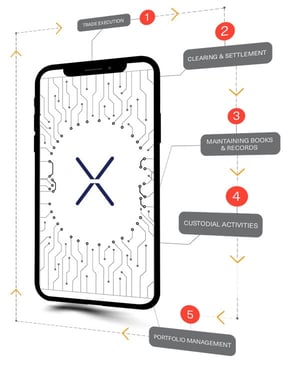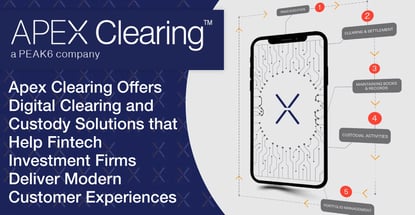In a Nutshell: The era of digital transformation in financial services is also an era of democratization. A growing number of consumers are looking to participate in sectors of the market, like investing, that a generation or two ago were far more walled off from. One of the firms leading that surge is Apex Clearing, with its lean B2B model for digital clearing and custody solutions. Apex has emerged as a go-to platform partner for a new wave of fintechs capable of quickly scaling up and delivering convenient, commission-free investment services to audiences already attuned to seamless mobile banking and e-commerce.
In case you haven’t heard, “banking” is now an app. Just like “shopping.”
Glibness aside, consumers are increasingly coming around to the view that buying things and managing their money are two sides of the same phone. Although it’s probably unrealistic to imagine a time when brick-and-mortar banks go away entirely, thinking the current trend is going to reverse is equally off base.
All around the world of financial services, new modalities are emerging to disrupt the legacies of the past. Over the past few years, for example, investment services have loosened their ties and gone online, with a dynamic new set of players bringing a new tone and approach to new consumers.
These new firms aren’t just delivering convenience, they’re changing the numbers too — online investors now largely expect their experience to be commission-free.
Apex Clearing has been working behind the scenes as a partner to the most influential fintech disruptors in the investment space since 2012. If you’re a consumer, you haven’t come across Apex directly — it’s a pure B2B platform provider. But if you’re working in the space, you may already appreciate the extent of Apex’s influence.
Apex is a clearing and custody engine at its core — a modern, enterprise-grade platform capable of supporting an evolving gamut of investment use cases, CEO William Capuzzi told us. Then couple that with an API suite that lets its partners tool and retool on a dime.
“The result is brokerage solutions for the fintech community,” Capuzzi said. “Clients wanting to push the investment industry to a more digital solution set come to us to do the things they need to do in order to provide that seamless experience.”
Empowering Fintech Firms to Launch and Scale
Part of the reason for Apex’s success is that it does so much with so little.
“Our job is to open accounts seamlessly and efficiently, fund those accounts seamlessly and efficiently, and provide trading,” Capuzzi said. This may seem mundane until you realize that a total of only about 350 employees supports roughly 9 million accounts, and more than 800,000 transactions a day.
“More than 50% of our employees are technologists,” Capuzzi said. “When you can open 900,000 accounts in a month with 350 people, it gives you some sense of the scale within the company.”

William Capuzzi, Apex Clearing CEO.
Other strengths stem from embracing the future while respecting the present. As a provider, Apex offers the right mix of nimbleness and expertise for providers looking to enter and scale quickly to meet emerging needs.
“Traditional competitors are big and they have assets, but our clients can’t work with them because their tech is old, their compliance regimes are outdated, and the pricing they get just doesn’t work,” Capuzzi said.
For example, Stash, an Apex customer, serves customers with as little as $100 in their investment accounts.
“Other large custodians would never support a customer that caters to a client who has $100 to spend,” Capuzzi said. “Because those firms have thousands of employees and they just can’t support that type of thing.”
On the other side of the equation are smaller competitors that live purely on the technology side of the industry.
“They’re not custodians,” Capuzzi said. “The risk for the fintech firm is you have to have someone with the brokerage understanding of how the markets work and with the financial backing to support clients not just when things are fine. Times like these past few weeks are, frankly, when we earn our keep.”
Revenue Splits and a Commission-Free Marketplace
There’s even more to this picture, however, because it’s what Apex has done with its platform that has given its clients a leg up and led to the transformations that are impacting investment services.
The commission-free approach is the highlight. What’s driving thousands of new participants into stocks and bonds is this mix of mobile availability at no cost, which Apex has been at the forefront of providing.
 As Capuzzi explains, commission-free is possible because Apex runs so lean. “It’s pretty simple, right?” he said. “We’re a small, totally fintech company. Cost per transaction is just really low.”
As Capuzzi explains, commission-free is possible because Apex runs so lean. “It’s pretty simple, right?” he said. “We’re a small, totally fintech company. Cost per transaction is just really low.”
Beyond that, and more fundamentally, innovation is in the company’s DNA.
“We found ways to create alternative revenue streams,” Capuzzi said. For example, when investors open accounts, they move cash in. Apex invests that cash on behalf of its clients.
Another revenue source emanates from stock loans, which originate in the securities held by individual investors. When one broker or dealer lends securities to another, the borrower pays collateral slightly higher than their market value along with a fee that goes to the lender and to the clearing broker facilitating the transaction. Both of those streams represent revenue-generating opportunities for Apex and its clients.
Apex also receives compensation for directing transactions to third parties for execution. Known as payment for order flow, this compensation results both from lower internal costs and the fees that are generated.
“There are ways for us to create splits in revenue streams to where our clients are happy with what they’re making, and we’re happy,” Capuzzi said. “We don’t take a charge — there’s no explicit fee. What we do is find ways for us to partner together, and if you make money and you grow, Apex grows.”
Apex: Bringing Disruption to Investment Services
It’s a strategy that works for nearly two dozen carefully curated providers.
“We’re pretty discerning — they have to be a fit for us, and obviously we need to be a fit for them,” Capuzzi said. “And we spend a bunch of time building really tight relationships with our customers.”
Tight to the extent that Apex clients generally have access to Capuzzi’s cellphone number. Aside from leading to a few dinner interruptions, openness also builds trust that leads to ongoing creative synergies.
“It’s the way we learn about what’s next,” Capuzzi said.

The advent of fractional shares at Apex is a great example. “Shares are an artifact of how Wall Street evolved,” Capuzzi said. “But stocks are not splitting, and millennials can’t afford to buy shares of the stocks they want. If Tesla’s trading at $700 and you only have $500 — well, you’re out of luck. So, why not provide the ability to just buy $500 worth of whatever it is you want to buy?”
Conversations with a client — Stocktwits — led Apex to build fractional sharing into its platform. “We were like, you’re totally right, it’s totally smart,” Capuzzi said. “And so we kicked off building out dollar-based investing after having our quarterly meeting with Stocktwits.”
More innovation is on the horizon. “The part we’re focused on now is around connecting the dots between banking and investing,” Capuzzi said. “We’re working with a number of banks to create a much better, more fluid, more real-time connection.”
Streamlining the account opening process is another area Apex is tweaking. “I haven’t seen anyone in fintech pull information off a barcode on the back of someone’s driver’s license to help open the account,” Capizzi said. “Little things like that help us continue down the path of creating more efficiency for our clients.”
Advertiser Disclosure
CardRates.com is a free online resource that offers valuable content and comparison services to users. To keep this resource 100% free, we receive compensation for referrals for many of the offers listed on the site. Along with key review factors, this compensation may impact how and where products appear across CardRates.com (including, for example, the order in which they appear). CardRates.com does not include the entire universe of available offers. Editorial opinions expressed on the site are strictly our own and are not provided, endorsed, or approved by advertisers.



![12 Credit Cards with the Best Customer Service ([updated_month_year]) 12 Credit Cards with the Best Customer Service ([updated_month_year])](https://www.cardrates.com/images/uploads/2020/01/Credit-Cards-with-the-Best-Customer-Service.jpg?width=158&height=120&fit=crop)
![9 Expert Solutions: Build Credit Without a Credit Card ([updated_month_year]) 9 Expert Solutions: Build Credit Without a Credit Card ([updated_month_year])](https://www.cardrates.com/images/uploads/2018/05/without2.png?width=158&height=120&fit=crop)
![Discover Card Pre-Approval: 4 Best Offers to Prequalify ([updated_month_year]) Discover Card Pre-Approval: 4 Best Offers to Prequalify ([updated_month_year])](https://www.cardrates.com/images/uploads/2016/09/discover-pre-approved.jpg?width=158&height=120&fit=crop)
![Compare Credit Cards: 18 Best Offers Today ([updated_month_year]) Compare Credit Cards: 18 Best Offers Today ([updated_month_year])](https://www.cardrates.com/images/uploads/2017/06/comparison2.jpg?width=158&height=120&fit=crop)
![Credit One Bank: Reviews & 5 Best Offers ([updated_month_year]) Credit One Bank: Reviews & 5 Best Offers ([updated_month_year])](https://www.cardrates.com/images/uploads/2018/01/creditone.png?width=158&height=120&fit=crop)
![7 Best Credit Card Offers Right Now ([updated_month_year]) 7 Best Credit Card Offers Right Now ([updated_month_year])](https://www.cardrates.com/images/uploads/2020/02/Best-Credit-Card-Offers-Right-Now.jpg?width=158&height=120&fit=crop)
